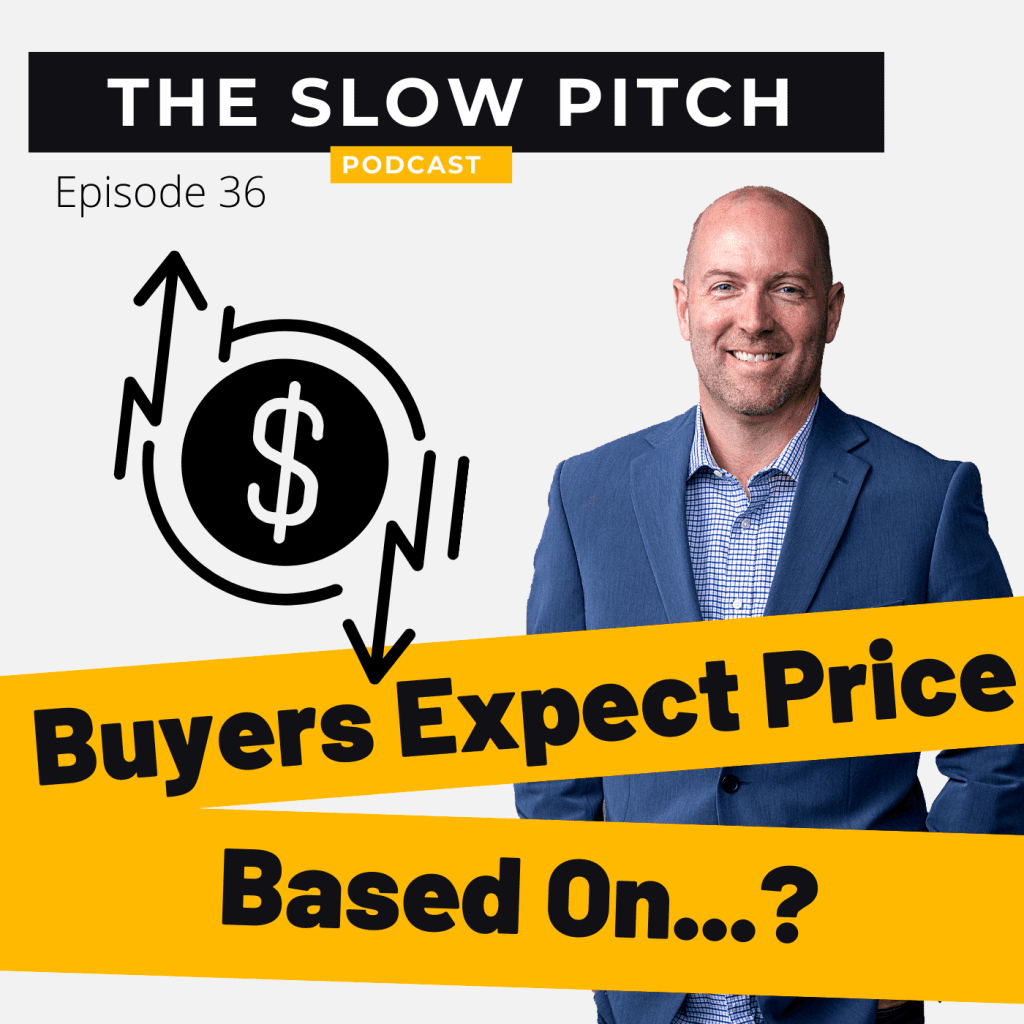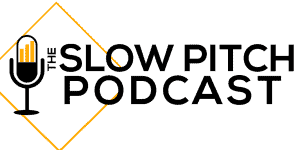What Is Price Based On? (Mini)


Notes
What Is Price Based On?
When you sell, what do potential buyers base their expected price on? What is price based on? This episode is another mini episode where Rob talks about how buyers see pricing, where they might base their knowledge on, and how you need to see their view of price. Once you understand how they view price, you need to begin to ask additional questions to learn what their expectations are based on.
When we buy something, we begin looking around. Investigating online. Asking others. Getting some preliminary pricing. Getting quotes from possible businesses. Once we start researching, we get an idea what thing cost and start to set price expectations mentally. What if the price in their head is significantly different than your price?
When a potential buyer approaches you after all that work they think they know what your price is. Based on all that work, they should have an idea; however, they may be wrong. You’ll need to learn what they are thinking before you present price.
Related Article:
A Quick Guide to Value-Based Pricing
Related Episodes:
When a Potential Client Says Your Price Is Too High – How To Respond Role Play
Don’t Be Afraid To Raise Prices (How To With a Returning Customer)
How to Find Pain in Sales. What Is Pain in Sales?
Music: "Clydesdale Funk" by Cast of Characters, written by: Dustin Ransom.
The Episode
Rob 00:08
Welcome back, everybody to The Slow Pitch. And today I had a question about a salesperson who had a call, and in their call, the potential buyer said something along the lines of, Hey, your price is way too high, or it was something a little bit like it was just a little off your price is not right. It doesn’t seem right. It doesn’t seem like that’s the way it should be. And they asked the question, why would they say that? I know my pricing… Why would they tell me that that’s… my pricing is wrong. And so in this episode, we’re gonna get into how people perceive price and how to sell against it.
V/O 00:41
You’re listening to The Slow Pitch Podcast, a podcast about selling less and closing more.
Rob 00:49
The first thing that comes to mind to me is where did they get that information? So if your potential buyer says, Hey, your price is a little bit high, or it’s a little bit off, or I don’t understand where you’re getting your numbers, any of those kinds of things, the first question I get is, they always want to ask back. So you know, why do you say that if a prospect or potential buyer said that to me, I would ask the question, Why are you asking that? I’m not sure I understand what you mean by that. And they usually say, Well, I spoke to a competitor of yours. That’s usually their reference point is a competitor. The second piece is, is well, I did a little research online, and Google tells me this. So let’s talk about both of those options. The first option is it’s a competitor that they’ve spoken with, that’s not unusual. In fact, that’s probably the number one answer that you’re going to get back as I talk to your competitor or a competitor. And they said that the price should be this. So if your price point that you’re quoting is $2,000 and your competitor price is at $500. That should be an issue that you have to figure out and explore why they said $500, and I’ve had it where people say, yeah, it’s $500. And I said, Okay, well, can we get into some of the details of what’s included in that $500, because I’m adding stuff in here that shouldn’t be in here. And in that conversation, if you start to really explore what they’re quoting, a couple things usually come up. One is, this is a newer company, or a new person who’s in this industry. Now, who’s never done this before. And they really think that that’s the price that it should be. But the reality is, is they’re just trying to get their feet wet, they’re trying to get some experience, they’re trying to get all the stuff that they need to get so that they get new clients in the future. So they’re forgoing some extra profit so that they can say, hey, I work with so and so or work with several clients, that kind of thing. And then maybe, so if you’re having to combat with something like that, then there’s some questions you need to ask back of the potential buyer. And the first question I would ask is, is why do you think that they’re pricing it at that price point? I’m just curious. I’m not I’m kind of confused. And so I’m kind of curious what you think, and what they might say as well. They’re trying to just get bare bones. And I told them, that price was really important to me. And I would say, okay, then it sounds like, you know, that sounds like it’s a good fit for you, I wouldn’t try to charge you more than what you think is reasonable. And I think I would go back to that person and tell them, that’s what you want for that price. And then when they say, okay, that’s what I figured, if that’s what they say, a lot of times, they will not a lot of times they’ll push back and say, give me I feel like that’s just too low. You know what I mean? Like, even though they used it against you, they will come back and push back and say, No, I don’t I don’t think it’s right. So don’t be too afraid to push back on this number, right? In that conversation. When I asked those questions about why they think that they’re charging at that price, they will bring up things like whether they’re newer, or they’re, you know, they’re offering the minimal pieces that they can offer. And there’s some add on pricing that will give me more stuff. And I would ask some questions then and dig into that to like, well, how much more what does that look like? And what are some of the add on things, because what may have been happening is just like the airline who says it’s $99, but when you go buy the ticket, it’s actually $300. Because you get this, this, this, this all these extra fees, that were not there that you would need to get to, to your destination. That’s one piece this the other piece of that is is if they’re their reference point is a competitor and your price is $2,000. But your competitor that they quoted out before you was $10,000, how does that position you? And so it’s really important to figure out what is the competitor pricing against you? If they came back at $10,000? Then, then you need to kind of go whoa, okay, I’m either really low, I’m really affordable, which may be the case or what am I missing here? Or what am i What are they adding that may or may not be necessary? So I’ve had it when people say a really high number on the other end. And then I might ask, why are they charging that much? And they would they might come back and say well, they they’ve been around for a long time. They’ve got this they got that and they’re gonna have all these extra people involved with it and or whatever that other stuff is. And what if that’s all the same? Then I would might ask the question, what if, what if what I’m telling you in my price is including those same things, but does that does that mean I should or should I raise my price? I mean, I’m confused. What do I do and sometimes you end up losing it because your price too low, and sometimes you lose it because it’s priced too high. But remember the point of this whole episode really is I want you to understand that people’s pricing is relative to who they spoke to last, or who they spoke to previously. So it’s just like when you go get a meal somewhere and at one place and you drive into one drive thru, or one in restaurant, and the price is $20 for this particular meal, but you go across the street, and it’s $50 for the same meal, or what it seems like the same products on a plate, why are you paying one versus the other, and so and people will do it. So you have to recognize that even if your price is too high, or your price is too low relative to who they spoke to last, that may be irrelevant, maybe there’s a reason they want to put their money at that level, whatever that money is, if people want it bad enough. And that’s why getting into the pain questions is really important. But if people want it bad enough, it doesn’t matter what the price is, if they want an experience, if they want a really nice looking item, like a flat screen TV, let’s say it looks like the best there is in the world, they might pay $3,000 for it, even though there’s something that’s very, very subtly different. That goes for half that price. That’s a status thing. So there’s different things that motivate people on why they would buy at a certain price. So don’t be afraid of the price question, dig into it, find out where they got the information, why they feel that that’s important. But more importantly, go back to your pain, if your pain questions, and the numbers that are associated with those pains, can offset or make sense for that purchase. That’s when you know, it’s okay, if it doesn’t make sense. And you’re not a good fit. Because your price is way too high based on the pain that they have, then don’t sell it, you want to be known as the person that says, I’m too high. This is not the this is not the product or service for you, you should find somebody that can do it for less, and they will have a sense of loss, and they will want to do more business with you. And they may end up finding the money for you. But more importantly, it’s about the pain, the dollars associated with it, and the reference point that they work with, and knowing what their motivation is at a price point. So hopefully that helps always remember when there’s a reaction to your price kick back to did I get enough pain? Do I understand how this is affecting them personally? And more importantly, and just as importantly, I should say is where did they get their reference point from before if they have no reference, you’re their first reference. And so when they go somewhere else, somebody may price it higher, somebody may price it lower. So just recognize you should really be speaking about price, not until the very end of your process when you get to that point where it makes sense. And that’s when you’d have that conversation. So until next time, hopefully that helps you guys, please reach out to us. We have a lot of questions that come in, and we want to make sure we get to all of them. And until next time, we’ll see you.
V/O 07:34
Thank you for listening to The Slow Pitch. Do you have a question about sales? Call or text your question at (608) 708-SLOW that’s (608) 708-7569 or you can email them to Questions@TheSlowPitch.com. Slow Down and Close More.
Rob 08:23
Thanks as always for listening today. If you like this podcast, please subscribe and leave us a review. We really appreciate it. Follow us on Twitter, Instagram and Facebook at The Slow Pitch. We were mixed today as always by Johnny Polakis. And we were produced by High Gravity Studios. Music credits and other notes are in the show notes section on TheSlowPitch.com And we’ll be back with another episode soon.








